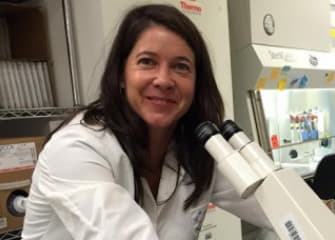
Susana Valente, Ph.D.
The Campbell Foundation, a nonprofit organization dedicated to funding HIV/AIDS research, has awarded a $79,151 grant to Susana Valente, Ph.D. at The Scripps Research Institute in Jupiter, Fla.
Valente is Associate Professor, Department of Immunology and Microbial Sciences at Scripps Florida, where she and her team have been targeting HIV latency – that is HIV found in hidden reservoirs in various organs of the body, making it difficult to detect.
The Valente laboratory is exploring the potential targeting of a highly potent activator of HIV production known as the Tat protein for which there are currently no available drugs. She and her team are looking at didehydro-Cortistatin A (dCA), a novel molecule closely related to a natural product isolated from a marine sponge, that can reduce the size of the latent HIV reservoir pool by blocking ongoing viral replication, reactivation and replenishment.
“One interesting feature of this molecule is that even when dCA treatment is halted, virus production does not rebound, as usually happens with other anti-retroviral drugs, because viral RNA production is shut-off or driven into a state of deep-latency,” says Valente.
Valente’s research is unique in that the team’s goal is to “deep freeze” the HIV virus in the genome to eradicate the latent viral reservoir. This approach is different from others that have been designed to activate the latent virus and then kill it.
“The Campbell Foundation has always focused on providing grants for novel and groundbreaking research. Dr. Valente and her Scripps team certainly fit the criteria,” said The Campbell Foundation’s Executive Director Ken Rapkin. “It is our hope that this grant will provide Dr. Valente with additional insights into her existing research and lead her to a better understanding of how to suppress the virus in these latently infected cells.”
In approving the grant, The Campbell Foundation’s Peer Review Board noted the following:
“This is a very interesting project with refreshing novelty beyond the typical ‘kick and kill’ variations that have dominated the ‘cure agenda’ imposed by NIH.”
“The potential impact of the proposed work is high-risk, high-gain. The concept of increasing latency could lead the cure field in a new direction with this approach. In this way, dCA could act as a pilot compound.”
There are an estimated 37 million people in the world living with HIV today and an estimated 17 million receiving antiretroviral therapy, according to the World Health Organization. Worldwide an estimated 2.1 million people became newly infected with HIV in 2015.
ABOUT THE CAMPBELL FOUNDATION
The Campbell Foundation was established in 1995 by the late Richard Campbell Zahn as a private, independent, nonprofit organization dedicated to supporting clinical, laboratory-based research into the prevention and treatment of HIV/AIDS. It focuses its funding on supporting alternative, nontraditional avenues of research. In its 21st year, the Campbell Foundation has given away more than $10 million dollars, with about $1 million going to direct services. For more information visit www.campbellfoundation.net. Follow us on Facebook, YouTube and Twitter.
ABOUT THE SCRIPPS RESEARCH INSTITUTE
The Scripps Research Institute (TSRI) is one of the world's largest independent, not-for-profit organizations focusing on research in the biomedical sciences. TSRI is internationally recognized for its contributions to science and health, including its role in laying the foundation for new treatments for cancer, rheumatoid arthritis, hemophilia, and other diseases. An institution that evolved from the Scripps Metabolic Clinic founded by philanthropist Ellen Browning Scripps in 1924, the institute now employs more than 2,500 people on its campuses in La Jolla, CA, and Jupiter, FL, where its renowned scientists—including two Nobel laureates and 20 members of the National Academy of Science, Engineering or Medicine—work toward their next discoveries. The institute's graduate program, which awards PhD degrees in biology and chemistry, ranks among the top ten of its kind in the nation. For more information, see www.scripps.edu.



















